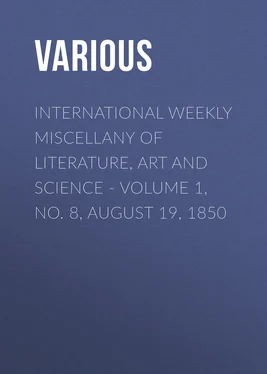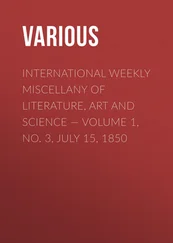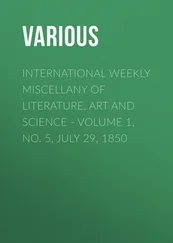Various - International Weekly Miscellany of Literature, Art and Science - Volume 1, No. 8, August 19, 1850
Здесь есть возможность читать онлайн «Various - International Weekly Miscellany of Literature, Art and Science - Volume 1, No. 8, August 19, 1850» — ознакомительный отрывок электронной книги совершенно бесплатно, а после прочтения отрывка купить полную версию. В некоторых случаях можно слушать аудио, скачать через торрент в формате fb2 и присутствует краткое содержание. Жанр: foreign_antique, periodic, foreign_edu, на английском языке. Описание произведения, (предисловие) а так же отзывы посетителей доступны на портале библиотеки ЛибКат.
- Название:International Weekly Miscellany of Literature, Art and Science - Volume 1, No. 8, August 19, 1850
- Автор:
- Жанр:
- Год:неизвестен
- ISBN:нет данных
- Рейтинг книги:5 / 5. Голосов: 1
-
Избранное:Добавить в избранное
- Отзывы:
-
Ваша оценка:
- 100
- 1
- 2
- 3
- 4
- 5
International Weekly Miscellany of Literature, Art and Science - Volume 1, No. 8, August 19, 1850: краткое содержание, описание и аннотация
Предлагаем к чтению аннотацию, описание, краткое содержание или предисловие (зависит от того, что написал сам автор книги «International Weekly Miscellany of Literature, Art and Science - Volume 1, No. 8, August 19, 1850»). Если вы не нашли необходимую информацию о книге — напишите в комментариях, мы постараемся отыскать её.
International Weekly Miscellany of Literature, Art and Science - Volume 1, No. 8, August 19, 1850 — читать онлайн ознакомительный отрывок
Ниже представлен текст книги, разбитый по страницам. Система сохранения места последней прочитанной страницы, позволяет с удобством читать онлайн бесплатно книгу «International Weekly Miscellany of Literature, Art and Science - Volume 1, No. 8, August 19, 1850», без необходимости каждый раз заново искать на чём Вы остановились. Поставьте закладку, и сможете в любой момент перейти на страницу, на которой закончили чтение.
Интервал:
Закладка:
"'Scott, too, who took a cordial delight in Campbell's poetry, expressed himself to the same effect. 'What a pity is it,' said he to me 'that Campbell does not give full sweep to his genius. He has wings that would bear him up to the skies, and he does now and then spread them grandly, but folds them up again and resumes his perch, as if afraid to launch away. The fact is, he is a bugbear to himself. The brightness of his early success is a detriment to all his future efforts. He is afraid of the shadow that his own fame casts before him .'
"'Little was Scott aware at the time that he, in truth, was a 'bugbear' to Campbell. This I infer from an observation of Mrs. Campbell's in reply to an expression of regret on my part that her husband did not attempt something on a grand Scale. 'It is unfortunate for Campbell,' said she, 'that he lives in the same age with Scott and Byron.' I asked why. 'Oh,' said she, 'they write so much and so rapidly. Now Campbell writes slowly, and it takes him some time to get under way; and just as he has fairly begun, out comes one of their poems, that sets the world agog and quite daunts him, so that he throws by his pen in despair.'
"'I pointed out the essential difference in their kinds of poetry, and the qualities which insured perpetuity to that of her husband. 'You can't persuade Campbell of that,' said she. 'He is apt to undervalue his own works, and to consider his own lights put out, whenever they come blazing out with their great torches.'
"'I repeated the conversation to Scott sometime afterward, and it drew forth a characteristic comment. 'Pooh!' said he, good-humoredly, 'how can Campbell mistake the matter so much. Poetry goes by quality, not by bulk. My poems are mere cairngorms, wrought up, perhaps, with a cunning hand, and may pass well in the market as long as cairngorms are the fashion; but they are mere Scotch pebbles after all; now Tom Campbell's are real diamonds, and diamonds of the first water.'"
"The foregoing is new to us, and full of a double interest. It is followed, however, by a statement, that needs a word of explanation. Mr. Irving says:
"'I have not time at present to furnish personal anecdotes of my intercourse with Campbell, neither does it afford any of a striking nature. Though extending over a number of years, it was never very intimate. His residence in the country, and my own long intervals of absence on the continent, rendered our meetings few and far between. To tell the truth, I was not much drawn to Campbell, having taken up a wrong notion concerning him, from seeing him at times when his mind was ill at ease, and preyed upon by secret griefs. I thought him disposed to be querulous and captious, and had heard his apparent discontent attributed to jealous repining at the success of his poetical contemporaries. In a word, I knew little of him but what might be learned in the casual intercourse of general society; whereas it required the close communion of confidential friendship, to sound the depth of his character and know the treasures of excellence hidden beneath its surface. Beside, he was dogged for years by certain malignant scribblers, who took a pleasure in misrepresenting all his actions, and holding him up in an absurd and disparaging point of view. In what hostility originated I do not know, but it must have given much annoyance to his sensitive mind, and may have affected his popularity. I know not to what else to attribute a circumstance to which I was a witness during my last visit to England. It was at an annual dinner of the Literary Fund, at which Prince Albert presided, and where was collected much of the prominent talent of the kingdom. In the course of the evening Campbell rose to make a speech. I had not seen him for years, and his appearance showed the effect of age and ill-health; it was evident, also, that his mind was obfuscated by the wine he had been drinking . He was confused and tedious in his remarks; still, there was nothing but what one would have thought would have been received with indulgence, if not deference, from a veteran of his fame and standing; a living classic. On the contrary, to my surprise, I soon observed signs of impatience in the company; the poet was repeatedly interrupted by coughs and discordant sounds, and as often endeavored to proceed; the noise at length became intolerable, and he was absolutely clamored down, sinking into his chair overwhelmed and disconcerted. I could not have thought such treatment possible to such a person at such a meeting. Hallam, author of the Literary History of the Middle Ages, who sat by me on this occasion, marked the mortification of the poet, and it excited his generous sympathy. Being shortly afterward on the floor to reply to a toast, he took occasion to advert to the recent remarks of Campbell, and in so doing called up in review all his eminent achievements in the world of letters, and drew such a picture of his claims upon popular gratitude and popular admiration, as to convict the assembly of the glaring impropriety they had been guilty of—to soothe the wounded sensibility of the poet, and send him home to, I trust, a quiet pillow.'
"Now, the very same facts are seen by different observers in a different point of view. It so happened that we ourselves were present at this dinner, which took place in 1842; and the painful circumstance alluded to by Mr. Irving did not produce the effect on us, that it appears to have produced on him. Without making a long story about a trifle, we can call to mind no appearance of hostility or ill-will manifested on that occasion; and on the contrary, recollect, in our immediate neighborhood, a mournful sense of distress at the scene exhibited, and sufficiently hinted in the few unpleasant words we have italicized. A muster of Englishmen preferred coughing down their favorite bard, to allowing him to mouth out maudlin twaddle, before the Prince, then first formally introduced to the public, and before a meeting whereat "was collected much of the prominent talent of the kingdom." Mr. Irving, himself most deservedly a man of mark, looked on with much, surprise. Looking on ourselves then, and writing now, as one of the public, and as one of the many to whom Campbell's name and fame are inexpressibly dear, we honestly think that of two evils the lesser was chosen. We think Mr. Hallam's lecture must have been inaudible to the greater part of the company."
The Archbishop of Lemburgh has prohibited his clergy from wearing long hair like the peasants, and from smoking in public, "like demagogues and sons of Baal."
The Persians have a saying, that "Ten measures of talk were sent down upon the earth, and the women took nine."
Authors and Books
No man is more enshrined in the heart of the French people than the poet BERANGER. A few weeks since he went one evening with one of his nephews to the Clos des Lilas , a garden in the students' quarter devoted to dancing in the open air, intending to look for a few minutes upon a scene he had not visited since his youth, and then withdraw. But he found it impossible to remain unknown and unobserved. The announcement of his presence ran through the garden in a moment, the dances stopped, the music ceased, and the crowd thronged toward the point where the still genial and lovely old man was standing. At once there rose from all lips the cry of Vive Beranger!
Конец ознакомительного фрагмента.
Текст предоставлен ООО «ЛитРес».
Прочитайте эту книгу целиком, на ЛитРес.
Безопасно оплатить книгу можно банковской картой Visa, MasterCard, Maestro, со счета мобильного телефона, с платежного терминала, в салоне МТС или Связной, через PayPal, WebMoney, Яндекс.Деньги, QIWI Кошелек, бонусными картами или другим удобным Вам способом.
Интервал:
Закладка:
Похожие книги на «International Weekly Miscellany of Literature, Art and Science - Volume 1, No. 8, August 19, 1850»
Представляем Вашему вниманию похожие книги на «International Weekly Miscellany of Literature, Art and Science - Volume 1, No. 8, August 19, 1850» списком для выбора. Мы отобрали схожую по названию и смыслу литературу в надежде предоставить читателям больше вариантов отыскать новые, интересные, ещё непрочитанные произведения.
Обсуждение, отзывы о книге «International Weekly Miscellany of Literature, Art and Science - Volume 1, No. 8, August 19, 1850» и просто собственные мнения читателей. Оставьте ваши комментарии, напишите, что Вы думаете о произведении, его смысле или главных героях. Укажите что конкретно понравилось, а что нет, и почему Вы так считаете.












